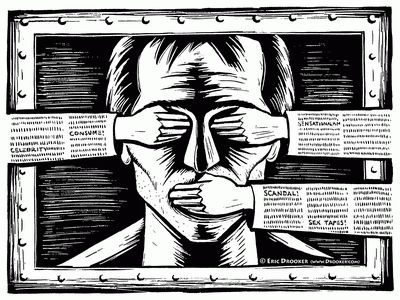 Bill Law writes for the BBC:
Bill Law writes for the BBC:
A recent decision by the United Arab Emirates to tighten restrictions on internet use has highlighted attempts by the authorities in Gulf states to staunch the flood of comment and criticism appearing on social media websites.
The amendments to the UAE's existing law on internet crime were announced last month in a decree by President Sheikh Khalifa bin Zayed al-Nuhayyan, the ruler of Abu Dhabi.
It says citizens who create or run a website or use the internet to deride or damage the state or its institutions face up to three years in prison. Foreign nationals will be deported.
The institutions include the president, vice-president, any of the rulers of the federation's seven emirates, their crown princes and deputy rulers, as well as the national flag, national anthem, or any symbols of the state.
The law also prohibits "information, news, caricatures or any other kind of pictures" that authorities believe could threaten security or "public order".
Sheikh Khalifa issued the decree just hours after the UAE was elected to a three-year term on the UN Human Rights Council, after standing unopposed for one of the five vacant seats reserved for Asian states.
Although some provisions of the legislation were aimed at preventing the proliferation of racist or sectarian views online, Human Rights Watch said its principal effect was to place severe restrictions on the rights to free expression and free association and assembly.
Joe Stork, the group's deputy Middle East director, says it has already had an impact on social media usage.
"It has had a chilling effect," he told the BBC, adding that prominent UAE activists had "stopped tweeting".
"Who decides what constitutes an insult, who determines where the red line is?" he asked. "It shows the utter intolerance of any kind of public criticism of the government."
***
Elsewhere in the Gulf, a lawyer for the prominent Qatari poet Mohammed al-Ajami --- also known as Mohammed Ibn al-Dheeb --- said his client was sentenced last week to life in prison.
He was convicted by a security court of insulting the country's "symbols" and encouraging the overthrow of its ruling system.
The case against him is said to be based on a 2010 poem critical of the Emir, Sheikh Hamad al-Thani, but activists believe the Qatari authorities were angered by a 2011 poem in which he denounced "all Arab governments" as "indiscriminate thieves".
Mr Ajami has been in solitary confinement since his arrest in November 2011.
And in Oman, a number of online activists were sentenced in July to jail terms from one year to 18 months for "defaming" Sultan Qaboos Bin Saeed.
The previous month, the Omani authorities threatened a crackdown, with Muscat's public prosecutor threatening all appropriate legal measures against those who made "inciting calls".
Many have criticised the Omani government's failure to carry out reforms promised in 2011 following demonstrations.
Another Gulf activist, Nabeel Rajab, is currently serving a three-year prison term in Bahrain.
His Twitter account, which has over 100,000 followers, says: "Because of tweets, I have been in jail since 9 July, sentenced to three years in prison. My friends are operating my account on my behalf."
The Bahrain government, however, says the sentence was for inciting illegal acts by encouraging people to protest and attend banned rallies.
In Bahrain all public gatherings and rallies have been banned, although the government insists the measure is only temporary.
***
The picture, though, is not all bleak.
The Saudi blogger, Ahmed al-Omran, says that when he set up his Twitter account in 2006 virtually no-one in his country was using the micro-blogging service.
"Now it has exploded," he told the BBC from Jeddah. "Saudi Arabia has the fastest growing population of Twitter users in the world. In one month last year it increased by 3000%."
"It is redefining how boys and girls get to know each other."